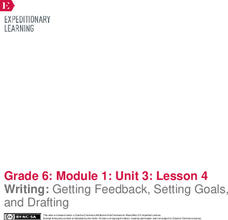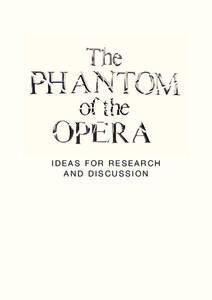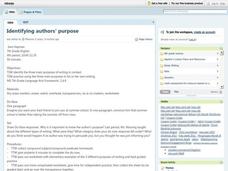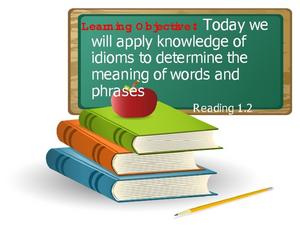EngageNY
Writing: Getting Feedback, Setting Goals, and Drafting
Why is it important to set goals as a writer? Scholars process feedback from their mid-unit assessments, writing down their strengths and weaknesses on index cards. Next, pupils use the feedback to begin drafting their hero's journey...
University of the Desert
Why Is Cultural Diversity a Positive Thing?
From more empathetic individuals to greater tolerance in government, learners explore the benefits of a culturally diverse world through a series of collaborative, discussion-based activities.
PBS
Broadcast News
Just because a story is on the news doesn't mean it's being presented fairly. Analyze news broadcasts with a instructional activity focused on evaluating television journalism. At home, kids watch a news show and note the stories...
Curated OER
Are You a Super Sign Speler or Speller?
Why is spelling important? Develop your class' spelling skills. They examine examples of homonyms, heteronyms, and creative spelling. They also photograph misspellings in the real world in order to discover the importance of spelling...
Madison Public Schools
Journalism
Whether you are teaching a newspaper unit in language arts, covering the First Amendment and censorship in social studies, or focusing on writing ethics in journalism, a unit based on the foundations of journalism would be an excellent...
Phantom of Opera
The Phantom of the Opera: Ideas for Research and Discussion
You could spend a full day discussing The Phantom of the Opera and not scratch the surface, but a set of lessons about the literary elements and themes of the musical production is a great start. Young thespians build upon the background...
Curated OER
What is Plagiarism?
What is plagiarism? Middle schoolers create a class definition of plagiarism and examine the importance of crediting people for their ideas. They review official school policy on plagiarism and study the consequences of presenting the...
Curated OER
Language Arts Skills: Listening and Speaking Strategies
Your class can practice communicating clearly. They practice listening and speaking through games such asTelephone and a social scavenger hunt. This is a solid lesson that helps apply good communication skills.
Southern Poverty Law Center
Choosing Reliable Sources
It is more important than ever that 21st-century learners develop the skills they need to become savvy consumers of media. Young learners locate and identify reliable sources of information with a helpful media instructional activity.
Curated OER
Diction: Formal and Informal Language
Coke or Pepsi? Is it the taste or the advertising that determines preference? As part of a study of diction, class members examine two passages, one formal and one informal, about Coca-Cola and Pepsi. In addition, they consider word...
Curated OER
Assessing Research Materials
Teaching learners how to evaluate a research source is an important part of the research process. The fresh idea here is that groups first develop a list of reasons why resources should be evaluated, transform these reasons into...
Curated OER
My Important Place
The story of Chief Joseph and the Nez Perce Indians of Oregon is told here. Pupils are shown pictures of the ancestral lands of the Nez Perce, and they learn about how they were forced to leave it. Students complete an essay which...
Jackson College
Paraphrasing: Borrowing Language and Ideas
How to paraphrase, when to paraphrase, and the difference between paraphrasing and quoting is the focus of a 23-slide, color-coded presentation that not only instructs viewers but also asks them to demonstrate their understanding of the...
PBS
What Is Newsworthy?
What is news? What is newsworthy? Who decides and what criteria do they use? Introduce young journalists to the basics of reporting with this media literacy lesson.
Anti-Defamation League
Is Olympic Coverage Sexist?
Women Olympians have come a long way since 1900 when 22 women competed for the first time. News coverage of the Olympics has also changed dramatically. What has been slow to change, however, is the language used in the coverage of female...
Curated OER
Identifying author's purpose
Why is it important to know an author's purpose? After reviewing the three main purposes of writing, seventh graders write a persuasive letter to convince why summer school is better than taking the summer off. They can then join in a...
Curated OER
Signal Words
What is a signal word, and why is it important? Since signal words are so important in a text, provide your learners with the list provided here. There are also three sample exercises provided here; they focus on the signal words but,...
Curated OER
Knowledge of Idioms
What is an idiom, and why is it necessary that we know and understand them? This brief PowerPoint helps answer these questions by looking at examples and offering a strategy for reading new text that might contain an idiom. The final...
Curated OER
Analyze Complex Words
What is a complex word, and why is it so important we know what they are? Download this helpful PowerPoint to introduce root/base words, prefixes, and suffixes to your emerging readers. Clear, relevant examples are given, as well as a...
Alabama Learning Exchange
Who, What, When, Where, Why, How?
Your youngsters are just starting to read texts and pull out important information. Use this graphic organizer with any text to help them practice identifying the who, what, when, where, why, and how of a text. Although the format of the...
University of North Carolina
History
The past helps to inform the present and the future—that's why the study of history is so important. The handout describes what historians do and why their jobs are meaningful. Readers learn about what to expect in a college-level...
Curated OER
Can You Get the Signal?
What is a signal word? Recognizing these words is an important step in both reading and writing formal text. Review a list of signal words (provided and organized into specific categories), and then have your class play a game to...
Curated OER
To Kill a Mockingbird Important Quotations: Fun Trivia Quiz
Find out how accomplished your class is at identifying quotes with this online interactive quiz. This quiz provides ten quotes from To Kill a Mockingbird by Harper Lee. Class members identify the speaker by choosing one of four given...
Curated OER
Quiz 1A: Using Where, When, What Time, and Why
Forming questions is an important skill for elementary learners to master. Using this 10 question short-answer activity, student use a prompt to form sentences beginning with where, when, what time, and why.

























